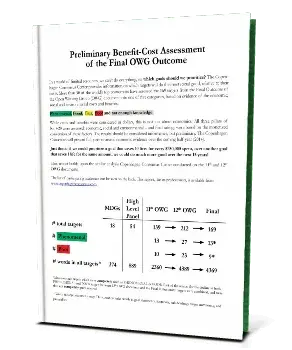Assessment of Final OWG Report featured in Financial Times
Published by

After one and a half years of deliberations, consultations, and negotiations, the UN’s Open Working Group (OWG) on Sustainable Development Goals released its final outcome document. Building upon the analyses conducted for the 11th and 12th sessions of the OWG, and the draft documents released then, we have now released the latest analysis of the outcome document in a new benefit-cost assessment report, which has been featured in the Financial Times.
In the new analysis, a total of 169 targets have been assessed by 30+ of the world’s top economists, and categorized into five ratings based on evidence of economic, social, and environmental costs and benefits. The categories, ranging from ‘phenomenal’ to ‘poor’ highlight which targets can yield the greatest benefit relative to their costs, and we therefore hope to provide some guidance to top decision makers as they move towards the next phase of defining and prioritizing which post-2015 development goals can do the most good.
While we know that the world has countless competing priorities, we also recognize that too many goals effectively means no goals. As shown in our latest analysis, while the OWG’s outcome document contains 43 fewer targets than those proposed in the 12th OWG session, this reduction has been achieved simply through combining previous stand-alone targets. This has resulted in fewer targets being categorized as either ‘poor’ or ‘phenomenal’.
|
|
MDGs |
High Level Panel |
11th OWG |
12th OWG |
Final |
|
# total targets |
18 |
54 |
140 → |
212 → |
169 |
|
# Phenomenal |
- |
|
13 → |
27 → |
13* |
|
# Poor |
- |
|
10 → |
23 → |
9* |
|
# words in all targets^ |
374 |
889 |
2360 → |
4389 → |
4369 |
Weighing benefits and costs is only one part of the equation when defining the Post-2015 goals and targets to be chosen – but we hope that our work contributes to doing more good for more people, if more phenomenal goals are prioritized by the UN and its member states.
Read the Financial Times article here, and the new OWG assessment report here.

